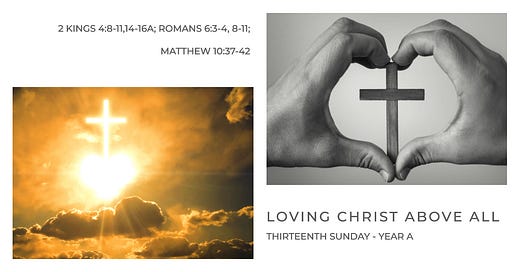2 Kings 4:8-11,14-16a; Romans 6:3-4, 8-11; Matthew 10:37-42
The commandment to love God states, "You will love the Lord your God with all your heart, with all your soul, and with all your strength" (Deut. 6:5), and the Decalogue is divided into two parts, the first one relates to God and the second one to our neighbor. Within this context, we must situate the words of Christ: "Whoever loves father or mother more than me is not worthy of me, and whoever loves son or daughter more than me is not worthy of me" (Matt. 10:37). Jesus, as the Word of God made flesh (John 1:14) and the image of the invisible God (Col. 1:15), embodies what was once attributed to the Father in the Old Testament.
The Greek word for 'love' used in today's Gospel is also the root for 'friend' and 'friendship'. In the Old Testament, we witness an example of such profound friendship between Jonathan, who loved David more than his own father, Saul (1 Sam. 18:1-3; 20:1-42). Saint Peter, too, used the same Greek word to express his love for Jesus (John 21:15-17). This word also encompasses the meaning of 'kiss'. Christ is the Bridegroom, and His love for His Bride, the Church, is everlasting (Jer. 31:3). The Church, yearning with love, desires to be united with her Bridegroom in a sacred 'kiss'.
Jesus states, "Whoever does not take up his cross and follow me is not worthy of me" (Matt. 10:38). The Christian way of life is the path of the cross (2 Cor. 11:21-33). However, in order to fully embrace it, we must first comprehend the Wisdom of the Cross (1 Cor. 1:18) and let go of unnecessary attachments (Mt 10:9). In the second book of the Maccabees narrating the persecution of the Jews, we find these words on the lips of the mother who just lost her six sons: "be worthy of your brothers" (2 Macc. 7:29). She spoke these words to her last and the youngest son tempted by the persecutor to abandon his faith. Our Mother, the Blessed Virgin Mary, could say the same to us all: "Be worthy of your brother Jesus". We cannot pursue friendships with the world, its honours and wealth (cf. 2 Macc. 7:24) while simultaneously striving to follow Jesus (cf. 2 Macc. 7:37). Moreover, we should always remember that according to the early Christians the world is unworthy of those who choose to follow the way of the cross (Heb. 11:36-38).
"Whoever loses his life for my sake will find it" (Matt. 10:39). This relinquishment of life takes place in the sacrament of baptism, wherein we experience both death and resurrection. The life we relinquish is the life enslaved by sin, while the life we discover is a life lived for God (Rom. 6:11). In baptism, we are united with Christ and become new creations (2 Cor. 5:17). Therefore, we joyfully sing of the Lord's goodness (Ps. 89:2), for He has called us "out of darkness into his wonderful light" (1 Pet. 2:9).
What is the prophet's reward? (Matt. 10:41). A new life: "about this time next year, you shall embrace a son" (2 Kings 4:16). What reward can a righteous person offer? The Gospel. When Saint Paul arrived in Galatia he was ill and yet the Galatians received him as "Christ Jesus". The apostle reciprocated their hospitality by preaching Christ to them (Gal. 4:13-14). And what reward awaits those who offer Christ's disciples, "these little ones", a cup of fresh water (Matt. 10:42)? The kingdom of God (see Matt. 25:34-35).
We are called to love Christ above all else, surpassing even our deepest affections. We are called to relinquish everything, even life itself, for His sake and to follow Him on the path of the cross. Only Lord and God can make such demands (John 20:28). However, throughout the history of Christianity, countless individuals have risen to meet these demands, enriching the world through their lives and deaths. In our current times, will we accept this challenge? Will we choose to love Christ above all?




